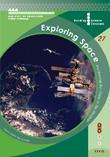You are here:
- Home »
- Teaching resources »
- Building Science Concepts »
- Titles and concept overviews »
- Exploring Space: Discovering Our Place in the Universe

Book 27: Exploring Space: Discovering Our Place in the Universe
Synopsis
Many children are interested in ideas about and the actualities of "exploring space". It is a subject that they want to discuss and are readily motivated to learn more about.
As occupants of planet Earth, our view of our world, the universe, and our place in it is influenced by our cosmology. In the cosmology of many cultures in the past, Earth has been seen as the centre of the cosmos. In the cosmology of modern science, Earth is a tiny speck in a vast universe. Our ideas about this topic, then, could be seen as an integral part of how we view our existence on Earth.
Note:
This set of books is accompanied by a picture pack and 4 posters linking to the astronomy themed books in the Building Science Concepts series:
The Moon
(Book 8);
Our Star, the Sun
(Book 20); Exploring Space (Book 27) and
The Night Sky
(Book 28).
The picture pack contains 16 space-themed cards.
The posters are: The Solar System, Phases of the Moon, The Southern Night Sky (Spring) and The Southern Night Sky (Autumn).
Concept overview
Use the concept overview, which is also on the inside front cover of the book, as a reference for the concepts that relate to Exploring Space: Discovering Our Place in the Universe.
![]() Read the concept overview
(PDF 38 KB)
Read the concept overview
(PDF 38 KB)
Links with other titles in the series
Most activities in this book have a strong research and reporting focus. They build on understandings gained through activities in other books in this series aimed at both levels 3-4 and lower levels:
- Book 8: The Moon (L3-4, Planet Earth and Beyond)
- Book 9: Shadows (L1-2, Material World, Physical World, Planet Earth and Beyond)
- Book 20: Our Star, the Sun (L1-2, Planet Earth and Beyond)
- Book 28: The Night Sky (L3-4, Planet Earth and Beyond)
- Book 30: The Air around Us (L1-4, Material World, Physical World)
Other relevant activities can be found in the science focus section on astronomy in Making Better Sense of Planet Earth and Beyond (page 91 ff.). The activities in this book provide an opportunity for you to assess the extent to which the concepts from these other books have been understood. The topic also links to the Nature of Science strand of the science curriculum, especially to an understanding of how and why our ideas change.
Assessment resources
Search the science section of the Assessment Resource Banks (ARB) website to find resources that assess the 'big idea' learning outcomes referred to in the concept overview for this title.

